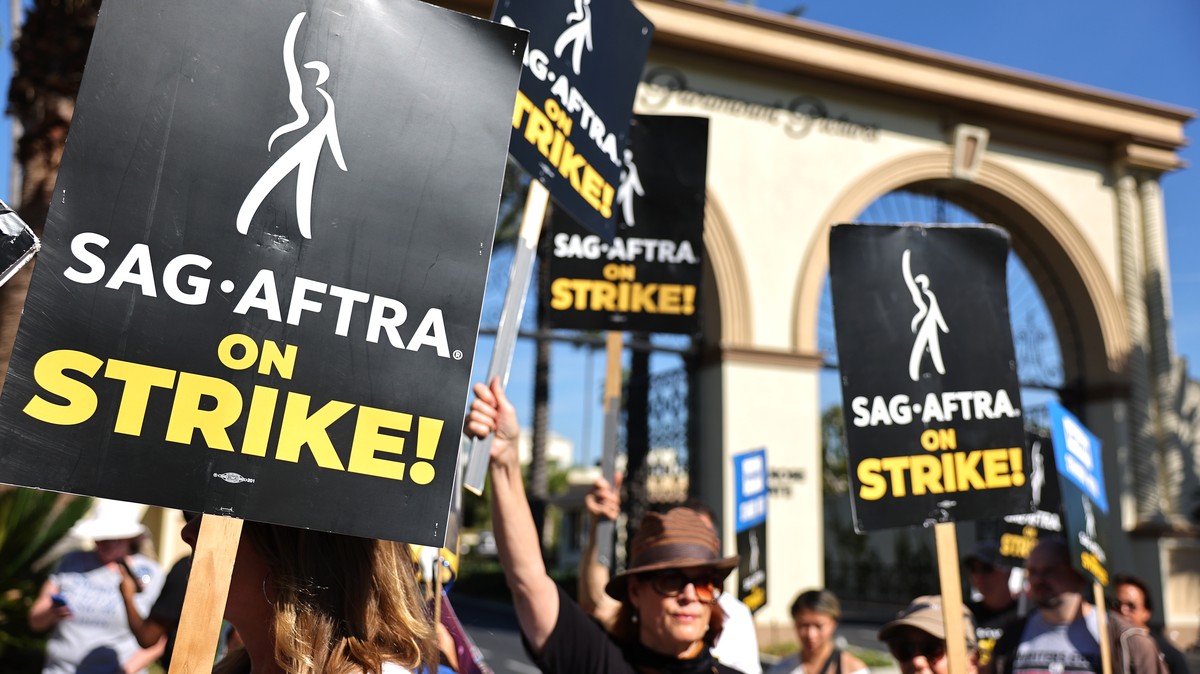A “groundbreaking” deal with an AI voice generation studio could be the first of many, the SAG-AFTRA national executive director said.

www.vice.com
'None of Us Want Our Voices Replicated': Voice Actors Say Union's 'Ethical' AI Deal Is Bad for Humans
A “groundbreaking” deal with an AI voice generation studio could be the first of many, the SAG-AFTRA national executive director said.
By
Jules Roscoe
January 10, 2024, 3:56pm
IMAGE CREDIT: GETTY IMAGES
SAG-AFTRA has made a “groundbreaking” deal with an AI voice generation studio to produce copies of actors’ voices, the union
announced on Tuesday. The deal is the first of its kind in the industry and comes after a 118-day-long strike by the union over the summer, which was largely over actors’
worries that AI might replace them.
The deal with
Replica Studios, a self-described ethical AI voice generation company, would allow unionized voice actors to opt in to providing their voices to be used as training data for the company. Performers would then approve the use of their AI voice double in projects by game developers at
AAA studios. The use of AI in games has become a topic of heated debate recently, particularly after breakout success online multiplayer game
The Finals' use of AI voiceovers
sparked a backlash from players and voice actors.
While many industry insiders and observers praised the deal, voice actors Motherboard spoke to lamented that it opens the door to replacing live humans with AI for much voice acting work.
“I believe a remnant of talented and deeply committed artists will remain in each field, but the bulk of our work will sadly be replaced by AI," voice actor
Steph Lynn Robinson told Motherboard. "SAG-AFTRA has set a precedent with this agreement and this is only the beginning.”
The union’s press release stated that, “the agreement ensures performer consent and negotiation for uses of their digital voice double and requires that performers have the opportunity to opt out of its continued use in new works.”
“This agreement contains an absolute consent requirement,” said SAG-AFTRA national executive director and chief negotiator Duncan Crabtree-Ireland, in a phone call with Motherboard. “It’s informed consent where [voice actors] are told precisely what projects [the AI voice double] would be used for, exactly the nature of that use, and they don't have to continue to grant that consent. If a member doesn't want to have a digital replica of their voice used, they absolutely can say ‘no’ from the very beginning.”
“I do want to note, whenever it is used with their consent, they also are compensated for that,” Crabtree-Ireland continued. “So for some members, this will be something that I think they're excited about because they will see this as a way to supplement the work they're doing in more traditional ways. It may give them access to opportunities they wouldn't have had before.”
Crabtree-Ireland said that this deal had been in the works for multiple years, and that if it was successful, subsequent deals with other AI voice generation companies could follow. “I certainly hope that Replica will serve as an example to the video game companies.”
Sarah Elmaleh, a voice actor and director who
previously told Motherboard about her concerns regarding AI voice doubling, said that a requirement for ongoing consent and transparency was “baked into” the agreement.
“What it comes down to for me is just continuing to advocate for collaboration on all levels,” she said in a phone call. “[Developers should] strive to be in dialogue with their performers in this open, ongoing way to address potential pitfalls.”
Kamran Nikhad, a union
voice actor who worked on
Marvel Avengers Academy and
Paladins: Champions of the Realm, told Motherboard in an email that he believed the deal was “coercion under the guise of consent.”
“Our voices won't be replicated and used in video games if we don't want them to, but we also won't be booking those jobs either,” Nikhad said. “While I can't speak on behalf of every VO actor, I can safely say that I've not yet seen a single actor excited about any of this. None of us want our voices replicated. We want to actually work because we love what we do.”
Tim Friedlander, the president of the National Association of Voice Actors (NAVA), told Motherboard in a phone call that the agreement—and possible subsequent agreements like it—was a step forward in regulating AI in the industry.
“Anytime we can get any AI company to be held accountable, that's great,” Friedlander said. “What we've been seeing in the voiceover industry is that whether we agree to having synthetic voices used or not, companies are out there creating synthetic voices and replacing us already. At least having this under a union contract puts some protections in place with this particular company.”
Friedlander
previously told Motherboard that any synthetic voice generation in the industry would have the greatest impact on actors just starting their careers. This deal, he said, would do the same.
“For video games primarily, I know a lot of the discussion is to use generative AI in regards to NPCs, to non-player characters,” he said in the phone call. “For a lot of voice actors, we have gotten our start playing 12 or 13 NPCs in a video game, and that's how you get your foot in the door. Those beginner voice acting jobs are going to be most affected.”
Many voice actors also expressed negative views of the deal in response to the union’s
announcement on X.
“I firmly believe this deal irrevocably harms the industry,” said non-union voice actor Troy Karedes, who
wrote on X that he was “appalled” by the announcement, in an email to Motherboard. “I don't personally know any actors who are enthusiastic about this deal or providing consent to use as AI.”
Actors also expressed concerns about the wording of the announcement, which said that the deal had been “approved by affected members of the union’s voiceover performer community.” Many wrote on X that they had not been asked about this.
Steve Blum, a
voice actor who has worked on
Mortal Kombat and the
God of War franchise, wrote that, “Nobody in our community approved this that I know of…Who are you referring to?”
Chris Hackney, who has worked on
Genshin Impact and
Legend of Zelda: Tears of the Kingdom,
wrote a response asking the union to “please confirm when you asked me about this and allowed me to vote on it? Pretty sure I haven't given my union approval to engage on my behalf.”
Crabtree-Ireland told Motherboard that the decision had been made unanimously by the union’s Interactive Media Agreement Committee, a group of members in the industry appointed by the national board, of which Elmaleh is the chair.
“There's quite a deep involvement by members in the negotiation and approval process for this,” Crabtree-Ireland said. “When we were ultimately able to get the terms that they wanted, expected, and needed in this contract, then that brought us to the point where they were prepared to endorse the deal.”
The entertainment industry has seen significant union activity over the past six months. While both Hollywood writers and actors went on strike over the summer,
both the WGA and
SAG-AFTRA eventually came to agreements with the studios that would allow them to use AI.
“What we wanted was protections against generative AI—the ability to decline having our voice prints replicated without being denied the work as a result of that choice,” Nikhad wrote. “The contract that was ultimately ratified wasn't that. This agreement, more or less, seems to be a continuation of that. It protects our voices from being scrubbed without our consent, but without the job security that was supposed to come with that.”
In response to the announcement,
some X users have
posted links to upcoming SAG-AFTRA town hall meetings, the first of which is
scheduled on Wednesday evening.
“There is obviously a good reason to be cautious,” Crabtree-Ireland said. “There's a good reason why we spent so much time and worked so hard to develop terms that are so protective. But there's also reason to think that this can provide more opportunities. We plan to pursue protective AI provisions in every contract that we have, and we plan to continue to evolve them at every contract as those contracts get renegotiated.”





 since.
since.

